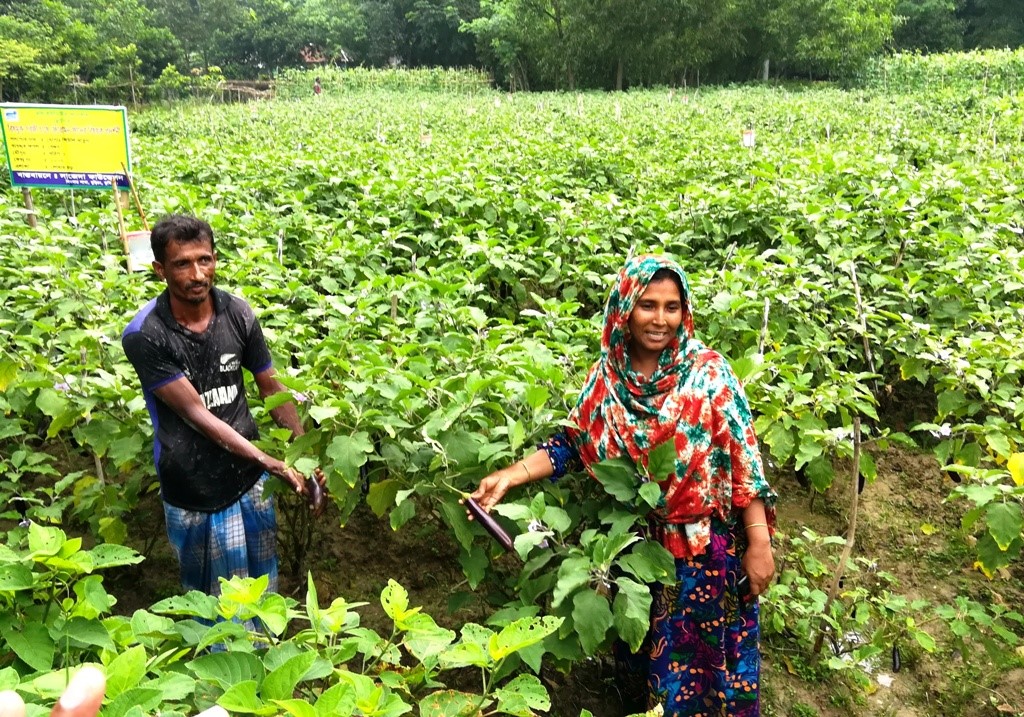
Entrepreneur Shiuli Khatun’s eggplant farm at Nimsar Upazila in Comilla District, Bangladesh (Credit: Md Anwarul Morshed)
Financing female entrepreneurs: a crucial step for socioeconomic development in Bangladesh
By Chowdhury Dilruba Shoma
13 November 2019
Financial empowerment of women has social and economic benefits for all citizens. Entrenched attitudes, customs and practices are preventing Bangladesh from realising the full benefit of the entrepreneurial skills of its female citizens.
My just-published research uses a liberal feminist perspective and undertakes a detailed analysis of data on cottage, micro, small and medium enterprise (CMSME) loans for the period 2010–2018, collected from banks and financial institutions. It shows that female entrepreneurs receive different treatment to men. Remarkably, despite policy changes in 2011, the total value loaned to female entrepreneurs stayed at just 3% to 4% of the total amount loaned in the years 2010-2018. Further, loans to women were smaller, averaging around half the value per loan of those to men during the period 2015-2018. From 2015 to 2018, about 2.5 million male CMSME entrepreneurs received loans, compared with just 180,000 female entrepreneurs, a ratio worse than 13:1. Thus, women receive far fewer and substantially smaller loans, and our analysis shows that there is little sign of improvement. Despite various announcements and initiatives, gender-based differences in lending practices remain in place.
Why?
Equality of rights for men and women, central to liberal feminism, is not in place in Bangladesh. Fewer opportunities for education and training mean women often lack skills in business administration and dealing with financial institutions. Women lack opportunities to gain technological knowledge and managerial skills, and the lack of business experience and networks, hamper women’s business performance.
Inequitable inheritance rights cause a lack of financial resources, and societal attitudes keep women out of positions of authority, meaning they lack influence over decision making. Traditional legal systems, traditional models of inheritance, and entrenched male-dominated hierarchies in the financial system restrict the capacity of female entrepreneurs to run CMSME businesses. Particularly, laws around formal economic rights do not support women in Bangladesh. Women have poorer access to sources of credit, find it harder to meet requirements for collateral, are less likely to obtain a loan than men – even if they meet the requirements! – and also face higher interest rates. All these things negatively impact on their potential to benefit from entrepreneurial activity and so achieve their fundamental rights.
There must be a wider appreciation of the need for, and value of, reforms that grow out of liberal feminism. Positive steps can break the existing cycle in which female entrepreneurs cannot get loans because they lack a record of accomplishment, and they lack a record of accomplishment because they cannot get loans.
A combination of legislatory and regulatory reform can mitigate many of the issues that prevent women gaining from, and contributing to, the CMSME sector in Bangladesh. Full implementation of the National Women Development Policy 2011 is essential. Women simply must obtain the same property inheritance rights as men. And rights must not only be granted, but enforced.
Such changes will increase lending to women, help turn the CMSME sector into an engine of growth in Bangladesh, and give female entrepreneurs greater independence and better access to fundamental rights.
This blog is based on the author’s article published in the Asia & the Pacific Policy Studies (APPS) journal. You can read the full paper, ‘Financing female entrepreneurs in cottage, micro, small, and medium enterprises: evidence from the financial sector in Bangladesh 2010–2018’, here.
This article is published in partnership with Policy Forum.
The views expressed are of the author(s) and do not necessarily reflect those of the institutions they are affiliated with.
About the author/s
Chowdhury Dilruba Shoma
Chowdhury Dilruba Shoma has a Master of Public Policy from the ANU’s Crawford School of Public Policy, and works at Bangladesh Bank.
